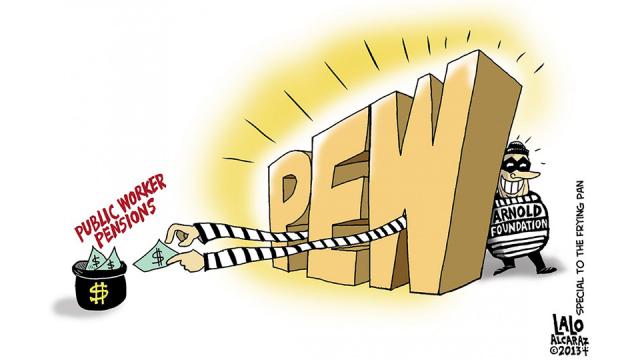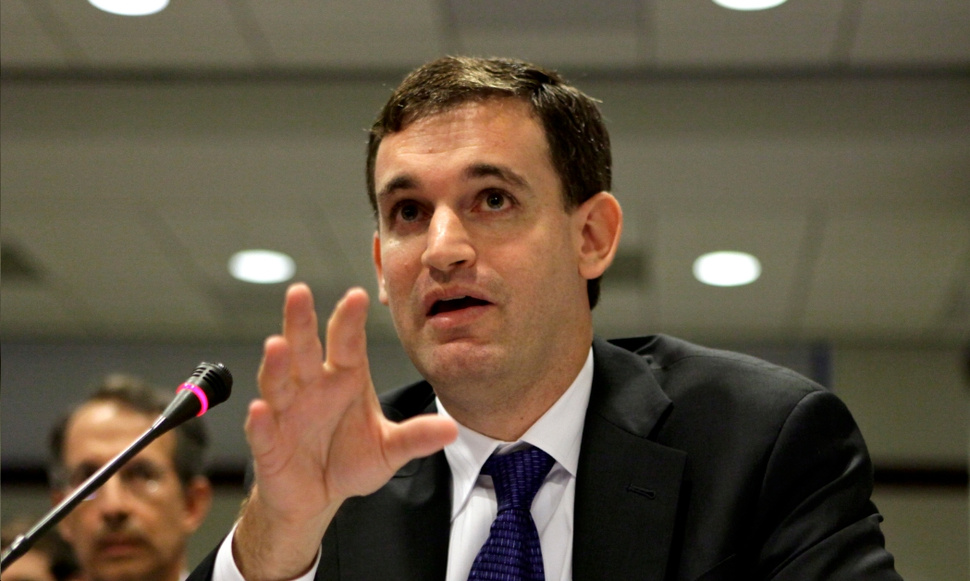
In May of 2013, the Pew Charitable Trusts released a report that sounded a frightening alarm. Titled “Retirement Security Across Generations” and widely cited throughout the national media, the study found that a lack of retirement savings, less guaranteed pension income and the economic downturn have collectively exposed the next generation of Americans “to the real possibility of downward mobility in retirement.”
Summing up the study’s implicit push to stabilize Americans’ retirement future, a Pew official declared that lawmakers must focus on creating policies that help workers “make up for these losses and prepare for the future.”
Pew’s analysis, though eye-opening, was not particularly controversial. Writing in the Wall Street Journal, conservative Martin Morse Wooster acknowledges that the Pew Trusts are “treated as benign truth-tellers, so high-minded as to be beyond politics” – and the call to shore up Americans’ retirement security, indeed, upheld the organization’s promise to “generate objective data.” Based on indisputable evidence, it proved that the country’s move away from guaranteed pension income – and states’ willingness to raid worker pension plans to finance massive corporate subsidies – will have disastrous consequences.
What was surprising was the fact that at the same time one branch of Pew was rightly sounding this moderate non-ideological alarm to shore up retirement security, and Pew’s Economic Development Tax Incentives Project was warning of states’ wasteful tax subsidies, a more political branch of the organization was working in tandem with controversial Enron billionaire John Arnold to begin championing an ideologically driven plan to make the retirement problem far worse.
This Pew-Arnold partnership began informally in 2011 and 2012 when both organizations marshaled resources to try to set the stage for retirement benefit cuts in California, Florida, Rhode Island and Kansas. With legislative success in three of those four states, Pew and Arnold created a formal partnership in late 2012 that targeted another three states, Arizona, Kentucky and Montana.
This formal partnership continues today, with the organizations issuing joint reports and conducting joint legislative briefings advocating cuts to guaranteed retirement income. It is widely expected that this partnership will continue working in these same states and potentially expand operations into Colorado, Pennsylvania, Oklahoma and Nevada.
Should an Enron Executive Be Dictating Public Pension Policy?
In the lead-up to his anti-pension partnership with Pew, Arnold’s most relevant connection to pensions and retirement security came from working at Enron – a company whose collapse destroyed its own workers’ pensions and helped to damage the financial stability of public pension funds across America. Indeed, as the New York Times reported, “The rapid decline of the Enron Corporation devastated its employees’ retirement plan.” Meanwhile, in a separate story, the newspaper noted that “across the United States, pension funds for union members, teachers, government employees and other workers have lost more than $1.5 billion because of the sharp decline in their Enron holdings.”
In light of Arnold’s corporate pedigree, it’s no surprise that, rather than “laying the foundation for effective government solutions,” as Pew’s mission promises, the Pew-Arnold partnership has been a campaign to reduce guaranteed retirement income for pensioners. As Marketwatch reported in 2013, Pew and Arnold are “advocat(ing) for cash balance plans.” They are advocating for 401(k)-style defined contribution plans as well.
Like President George W. Bush’s proposal to radically alter Social Security, many of these plans would transform stable public pension funds into individualized accounts. They also most often reduce millions of Americans’ guaranteed retirement benefits. In many cases, they would also increase expenses for taxpayers and enrich Wall Street hedge fund managers.
A Pension-Cutting Movement That Ignores Data
These pension-slashing initiatives are part of a larger movement that aims to reduce or eliminate guaranteed retirement income for public workers. Leading this movement under the euphemistic guise of “reform,” Pew’s Public Sector Retirement Systems Project and the Arnold Foundation are trying to distract attention from what McClatchy Newspapers documented: namely, that “there’s simply no evidence that state pensions are the current burden to public finances that their critics claim.”
Rather than acknowledge that truth, Pew and Arnold have successfully manufactured the perception of crisis – which has prompted demands for dramatic action. Pew and Arnold have consequently helped shape those general demands into specific efforts to cut guaranteed retirement income – all while downplaying (or altogether omitting) any discussion of the possibility of raising revenue through, for instance, ending taxpayer-funded corporate subsidies and so-called tax expenditures.
This deceptive message persists, even though these annual subsidies are typically far larger than the annual pension shortfalls. Indeed, to advocate cuts in retirement benefits, Pew and Arnold cite a 30-year, $1.38 trillion pension gap – a $46 billion annual shortfall. Yet, they rarely ever mention that, as the New York Times reports, “states, counties and cities are giving up more than $80 billion each year to companies” in the form of subsidies and tax expenditures.
Such an insidiously selective message is eerily reminiscent of Margaret Thatcher’s infamous “There Is No Alternative” framing. It suggests that harming millions of middle-class workers is the only way forward – and that states shouldn’t dare consider raising pension-fund revenue by eliminating corporate subsidies. Thanks to Pew, Arnold and other groups, this has now become the dominant argument even though the amount state and local governments now spend on such wasteful handouts is far greater than the pension shortfalls.
Perhaps the most famous illustration of the pervasiveness of this deceptive argument comes from Detroit. When the city recently declared bankruptcy, much of the media and political narrative around the fiasco simply assumed that public pension liabilities are the problem. Few noted that both Detroit and the state of Michigan have for years been spending hundreds of millions of dollars on wasteful corporate subsidies. Worse, the very same political leaders pleading poverty to demand cuts to municipal pensions were simultaneously promising to spend more than a quarter-billion taxpayer dollars on a professional hockey arena.
But as outrageous as the blame-the-pensioners mythology from Detroit is, it is the same misleading mythology that is now driving public policy in states across America. In Rhode Island, the state government slashed guaranteed pension benefits while handing $75 million to a retired professional baseball player for his failed video game scheme. In Kentucky, the state government slashed pension benefits while continuing to spend $1.4 billion on tax expenditures. In Kansas, the state government slashed guaranteed pension benefits despite being lambasted by a watchdog group for its penchant for spending huge money on corporate welfare “megadeals.”
In each of these states and many others now debating pension “reform,” Pew and Arnold have colluded to shape a narrative that suggests cutting public pension benefits is the only viable path forward. This, despite the fact that a) cutting wasteful corporate welfare could raise enough revenues to prevent such cuts; b) the pension “reform” proposals from Pew and Arnold could end up costing more than simply shoring up the existing system; and c) pension expenditures are typically more reliable methods of economic stimulus than corporate welfare.
Those inconvenient facts have been ignored in the political debate over pensions. Thanks to the combination of Pew’s well-known brand and Arnold’s vast resources, the pension-slashing movement’s extremist message has been able to dominate the political discourse in states throughout America.
The result is a skewed national conversation about state budgets – one in which middle-class public sector workers are increasingly asked to assume all the financial sacrifice for balancing the government books, and corporations and the wealthy are exempted from any sacrifice whatsoever.
A Microcosmic Story for the Citizens United Age
This is the story not merely of two nonprofits nor merely of one set of economic issues – it is a microcosmic tale of how in the Citizens United age, politically motivated billionaires can quietly implement an ideological agenda in local communities across the country.
Operating in state legislatures far away from the national media spotlight, these billionaires can launder their ideological agenda through seemingly nonpartisan foundations, with devastating legislative consequences for millions of taxpayers and families. And as the battle over America’s retirement proves, it isn’t just the infamous Koch brothers at work anymore.
In this particularly important fight over pensions, Arnold is leveraging his Enron fortune and his ties to top Republican activists to forge a powerful partnership with Pew. Having already spent at least $10 million on his crusade to cut retirement benefits, Arnold’s partnership with Pew is now driving and distorting the legislative debate over public pensions in at least seven states – and has helped enact huge cuts to retirement benefits in many of them.
With other billionaires now reportedly following Arnold’s lead and investing in the campaign to cut public workers’ retirement benefits, the Pew-Arnold plot is poised to expand into every state in America. Indeed, as Institutional Investor reports, “From Blackstone Group co-founder Peter Peterson to New York City Mayor Michael Bloomberg, some of the wealthiest Americans are beginning to pay increasing attention to this issue,” meaning that pensioners will “have to get used to billionaires brandishing checkbooks” in their political crusade to cut retiree benefits.
The Corporate Bait-and-Switch
The goals of the plot against pensions are both straightforward and deceptive. On the surface, the primary objective is to convert traditional defined-benefit pension funds that guarantee retirement income into riskier, costlier schemes that reduce benefits and income guarantees, and subject taxpayers and millions of workers’ retirement funds to Enron’s casino-style economics.
At the same time, waging a high-profile fight for such an objective also simultaneously helps achieve the conservative movement’s larger goal of protecting profligate corporate subsidies.
The bait-and-switch at work is simple: The plot forwards the illusion that state budget problems are driven by pension benefits rather than by the far more expensive and wasteful corporate subsidies that states have been doling out for years. That ends up 1) focusing state budget debates on benefit-slashing proposals, and therefore 2) downplaying proposals that would raise revenue to shore up existing retirement systems. The result is that the Pew-Arnold initiative at once helps the right’s ideological crusade against traditional pensions and helps billionaires and the business lobby preserve corporations’ huge state tax subsidies.
In bequeathing its brand to an Enron billionaire and embracing this campaign, Pew is being steered back toward its ultraconservative roots. In the process, the retirement security of millions of Americans is being jeopardized.
David Sirota is a journalist and best-selling author of the books "Hostile Takeover," "The Uprising" and "Back to Our Future." Contact him at ds@davidsirota.com and follow him @davidsirota.
3 WAYS TO SHOW YOUR SUPPORT
- Log in to post comments














